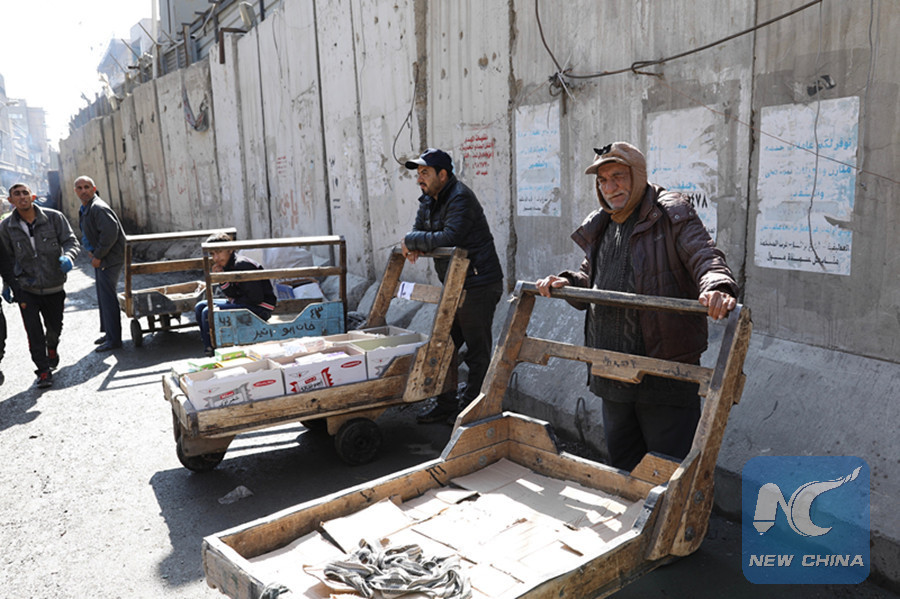
An Iraqi elderly porter waits outside a market in Baghdad to be hired on February 14, 2017. (Xinhua/Khalil Dawood)
BAQUBA, Iraq, Feb. 15 (Xinhua) -- Weak and sick, 64-year-old Munthir Haider still works hard daily to earn the bread for his family in Iraq's eastern province of Diyala.
"No work means death for me and for my family," Haider told Xinhua.
Haider works as porter, usually seen with his cart at a popular market in Baquba, the capital city of Diyala.
He has to support his poor family, but it is hard for him because there are not enough job opportunities while he has no pension or any other financial assistance.
Like other areas, Diyala is witnessing a sharp rise in the number of elderly laborers due to the hike in poverty rate after years of war and conflicts, particularly in the areas just liberated from the rule of Islamic State (IS).
Hassan al-Rubaie, an Iraqi economist, told Xinhua that the number of elderly laborers has climbed by 90 percent, and they have become a common phenomenon in Iraqi markets.
Another porter named Abu Arkan, 60, carries goods in a local electricity market in central Baquba.
"Poverty pushed me to work in a profession that does not fit with my age, but what can I do? I have to bring food to my family," he told Xinhua.
Abu Arkan used to be the owner of a shop in his ethnically-mixed city of Jalwlaa, some 70 km northeast of Baquba, before IS militants burned it, forcing him and his family to flee to Baquba in 2014.
"I lost everything back home so quickly and became a poor man, because my family and I couldn't take anything out from our house. We barely escaped with our lives," Abu Arkan recalled.
Abu Hassan, 58, was hired as a temporary cleaning worker. He works for long hours a day, but cannot earn enough money to buy food for his family.
The number of elderly laborers is rising sharply in Iraq, especially among the displaced people, who were forced to flee their homes and original careers during the war against IS since 2014.
"I hope that the current conference on reconstruction of Iraq in Kuwait would provide some help for us by rebuilding our cities so we can return home," said Abu Hassan, referring to the international meeting for reconstruction of Iraq being held in Kuwait City.
The elderly laborers are harder to get a job because they face unequal competition from the young workers.
"The elderly almost have no hope to compete with young men, especially for arduous jobs, which need the energy and strength of youth," Udai Abdullah, a young construction worker, told Xinhua.
al-Rubaie said most of the elderly workers are victims of the U.S.-led invasion into Iraq in 2003 and the destruction done by extremist groups like IS, which took over large swathes of land in northern Iraq in 2014.
"Elderly laborers is one example of the human tragedy that resulted from the extremism and terrorism," Rubaie said.
Rubaie said the government's social protection program, designed to reduce poverty by providing financial grants to the individuals and families in need, is insufficient.
"It cannot resolve all the cases of poverty, vulnerability and needs reforms," Rubaie said, adding that the program does not include the displaced people.
Many Iraqis said the problem of the rising number of elderly laborers requires greater government efforts in cooperation with the civil organizations to encourage the displaced people to return home, while providing jobs that fit their ages and abilities.
Local reports in Diyala indicated that the poverty rate there exceeds 30 percent, including 7 percent under extreme poverty.
However, the figures released by the United Nations Assistance Mission for Iraq said that 23 percent of total Iraq's population live in poverty, spending less than 77,000 Iraqi dinars (2.2. U.S. dollars) per person per month.
On Dec. 9, 2017, Iraqi Prime Minister Haider al-Abadi officially declared full liberation of Iraq from IS militants after Iraqi forces recaptured all the areas once seized by the extremist group.
Nevertheless, Diyala, like several other Iraqi provinces, is still suffering from severe damage of its infrastructure and substantial government support for its reconstruction process.

